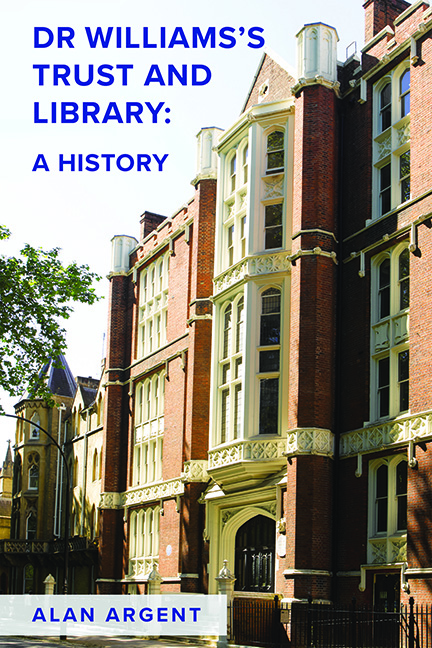Book contents
- Frontmatter
- Dedication
- Contents
- List of Illustrations
- Foreword
- Preface
- Abbreviations
- Notes on Dates, Money, Welsh Place Names and Publications
- Prologue
- 1 Dr Williams and His Will
- 2 Benjamin Sheppard, Receiver 1721–31: Faith, Fitness, and Diligence
- 3 Constructing the Library Building 1725–30: A Proper Plan
- 4 Francis Barkstead, Receiver 1731–47: Piety and Charity
- 5 John Cooper, Receiver 1748–62: Liberty and Liberal Dissent
- 6 Richard Jupp junior, Receiver 1762–95: A Very Respectable Body
- 7 Richard Webb Jupp, Receiver 1795–1850, and David Davison, Receiver 1850–7: Fashionable Sympathies Amid Increasing Light
- 8 Walter D. Jeremy, Receiver 1857–93: The Scrupulous Observer
- 9 Francis H. Jones, Secretary and Librarian 1886–1914: Introducing Order
- 10 Robert Travers Herford, Secretary and Librarian 1914–25: Application and Imagination
- 11 Stephen Kay Jones, Librarian 1925–46, and Joseph Worthington, Secretary 1925–44: A New Age with Old Strains
- 12 Roger Thomas, Secretary 1944–66 and Librarian 1946–66: Trusted Innovator
- 13 Kenneth Twinn, Secretary and Librarian 1966–76: Modest Dependability
- 14 John Creasey, Librarian, and James McClelland, Secretary, 1977–98: Mixed Blessings
- 15 David Wykes, Director 1998–2021: Past, Present, and Future
- 16 Dr Williams’s Trust: An Assessment
- Appendix 1 Trustees in 1723
- Appendix 2 Lists from Short Account (with later additions)
- Bibliography
- Index
1 - Dr Williams and His Will
Published online by Cambridge University Press: 26 May 2022
- Frontmatter
- Dedication
- Contents
- List of Illustrations
- Foreword
- Preface
- Abbreviations
- Notes on Dates, Money, Welsh Place Names and Publications
- Prologue
- 1 Dr Williams and His Will
- 2 Benjamin Sheppard, Receiver 1721–31: Faith, Fitness, and Diligence
- 3 Constructing the Library Building 1725–30: A Proper Plan
- 4 Francis Barkstead, Receiver 1731–47: Piety and Charity
- 5 John Cooper, Receiver 1748–62: Liberty and Liberal Dissent
- 6 Richard Jupp junior, Receiver 1762–95: A Very Respectable Body
- 7 Richard Webb Jupp, Receiver 1795–1850, and David Davison, Receiver 1850–7: Fashionable Sympathies Amid Increasing Light
- 8 Walter D. Jeremy, Receiver 1857–93: The Scrupulous Observer
- 9 Francis H. Jones, Secretary and Librarian 1886–1914: Introducing Order
- 10 Robert Travers Herford, Secretary and Librarian 1914–25: Application and Imagination
- 11 Stephen Kay Jones, Librarian 1925–46, and Joseph Worthington, Secretary 1925–44: A New Age with Old Strains
- 12 Roger Thomas, Secretary 1944–66 and Librarian 1946–66: Trusted Innovator
- 13 Kenneth Twinn, Secretary and Librarian 1966–76: Modest Dependability
- 14 John Creasey, Librarian, and James McClelland, Secretary, 1977–98: Mixed Blessings
- 15 David Wykes, Director 1998–2021: Past, Present, and Future
- 16 Dr Williams’s Trust: An Assessment
- Appendix 1 Trustees in 1723
- Appendix 2 Lists from Short Account (with later additions)
- Bibliography
- Index
Summary
An outline of Daniel Williams's career provides the background to the trust that bears his name. His concerns, extending from England to Wales, Scotland, Ireland, and North America formed part of a lively tradition. Daniel Williams himself was a central figure in London dissent in the early 1700s and shared with his trustees a vision for their Presbyterian understanding of Protestantism. They wished not only to resist the threats of Roman Catholicism and Jacobitism, but also to avoid the pitfalls of a narrow view of predestination, which implied that conduct and morality had no bearing on salvation. Williams's will endowed charities, touching on missions, preaching, elementary education, university training for ministers, and on his library in London. DWL contains books and manuscripts of wider interest than any narrow interpretation of religious dissent would admit. No longer aspiring to a national church order, English Presbyterians were soon to undergo the theological test of the Salters’ Hall debates of 1719.
Daniel Williams (c. 1643–1716) and His Contemporaries
In many ways Williams's career encapsulates the complex relations between English and Welsh dissent in the late Stuart and early Hanoverian periods. Born in Wrexham, Denbighshire, c. 1643, according to one biographer, he devoted himself to ‘Studies’ from an early age and may have been preaching ‘regularly’ by the age of nineteen. Among preachers then active in Wrexham were the Presbyterian Philip Henry (1631–96) whose son, Matthew, was nominated one of Williams's first trustees, and Morgan Llwyd (1619–59) who pastored a gathered church. At the Restoration some of Llwyd's wealthier followers conformed, although a nucleus of gentry and yeomen shunned the established church. A few years later John Evans (1628–1700) became minister of Wrexham's ‘Old Meeting’ (Independent and Baptist) and married the widow of the radical dissenter Vavasor Powell (1617–70). Evans's son, also John, would become Williams's assistant in London. Wrexham's nonconformists were reported in 1669 as numerous, but mostly of ‘ordinary condition’, although by the 1680s this town was deemed a ‘citadel’ of dissent.
- Type
- Chapter
- Information
- Dr Williams's Trust and Library , pp. 2 - 26Publisher: Boydell & BrewerPrint publication year: 2022



